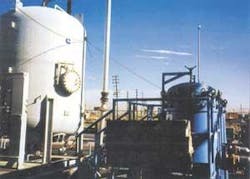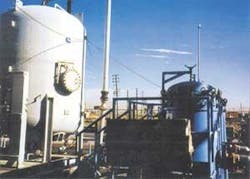Organoclay Aids Water Reuse at Canadian Refinery
A petroleum refinery in Alberta, Canada, discharged boiler feed water through a lime softener and wanted to recycle the water. The water contained 8 ppm of total organic carbon, of which lube oil was 3 ppm, with spikes of 9 ppm. The remainders where chelating agents and amines used for scale prevention. Several ppm of iron were also present. The water ran at 30 psi, 150 gpm and had a temperature of 176°F.
A vessel with 10,000 lb. organoclay was installed. Since this is boiler feed water, extensive backwashing was required to remove any suspended clay fines that add silica, and to remove salts such as sodium chloride, which is commonly associated with bentonite. The silica content then stabilized at 5 ppm, which was acceptable, and the conductivity also decreased to acceptable levels.
After the system was brought back on line, the oil content of the water was less than 0.5 ppm. The iron content was much lower, but not measured. The system has operated for over a year with no changeout. Thus, the organoclay not only removes the oil, it also removed the iron. It precipitated onto the anthracite at a pH of 7.8, causing the clay to turn a bright red - but it didn’t impede oil removal.
This also results in co-precipitation of other heavy metal cations. Because OilSorb™ organoclay, from Biomin Inc., operates at temperatures up to about 180°F, the water doesn’t have to be reheated very much, perhaps by 20°F, which results in an energy cost savings as well.
Contact: Biomin Inc., of Ferndale, MI, 248-544-2552, [email protected] or www.biomininc.com.

